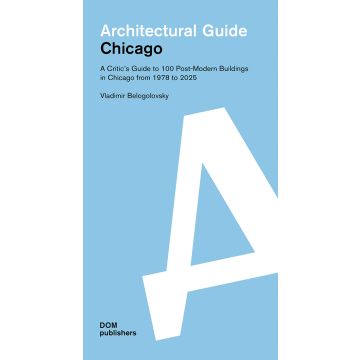Chicago. Architectural Guide
A Critic's Guide to 100 Post-Modern Buildings in Chicago from 1978 to 2025

Tags
Some architects regard a visit to Chicago as equal in importance to a pilgrimage to Rome or Athens: The soaring American metropolis at the shores of Lake Michigan has amassed an unmatched collection of first-rate buildings in every possible style since late nineteenth-century industrialization. This book looks at Chicago through the prism of Post-Modernism—under the premise that this style did not cease to exist sometime in the 1990s, but is, in fact, still with us today.
Starting with the 1978 Illinois Regional Library for the Blind and Physically Handicapped, curator and critic Vladimir Belogolovsky presents 100 structures, most of which were created after the turn of the millennium. These lavishly illustrated building descriptions are supplemented by introductory essays and interviews with Chicago architects, including Stanley Tigerman, Helmut Jahn and Jeanne Gang.
Some architects regard a visit to Chicago as equal in importance to a pilgrimage to Rome or Athens: The soaring American metropolis at the shores of Lake Michigan has amassed an unmatched collection of first-rate buildings in every possible style since late nineteenth-century industrialization. This book looks at Chicago through the prism of Post-Modernism—under the premise that this style did not cease to exist sometime in the 1990s, but is, in fact, still with us today. Starting with the 1978 Illinois Regional Library for the Blind and Physically Handicapped, curator and critic Vladimir Belogolovsky presents 100 structures, most of which were created after the turn of the millennium. These lavishly illustrated building descriptions are supplemented by introductory essays and interviews with Chicago architects, including Stanley Tigerman, Helmut Jahn and Jeanne Gang.
Some architects regard a visit to Chicago as equal in importance to a pilgrimage to Rome or Athens: The soaring American metropolis at the shores of Lake Michigan has amassed an unmatched collection of first-rate buildings in every possible style since late nineteenth-century industrialization. This book looks at Chicago through the prism of Post-Modernism—under the premise that this style did not cease to exist sometime in the 1990s, but is, in fact, still with us today. Starting with the 1978 Illinois Regional Library for the Blind and Physically Handicapped, curator and critic Vladimir Belogolovsky presents 100 structures, most of which were created after the turn of the millennium. These lavishly illustrated building descriptions are supplemented by introductory essays and interviews with Chicago architects, including Stanley Tigerman, Helmut Jahn and Jeanne Gang.
Weight:
640 g
Author:
Publisher:
Language:
English
EAN:
9783869224183
hoehe_mm:
245
breite_mm:
134
Year of publication:
2022
Categories: Travel, Travel Guides
Write Your Own Review
No manufacturer information and safety instructions available yet.